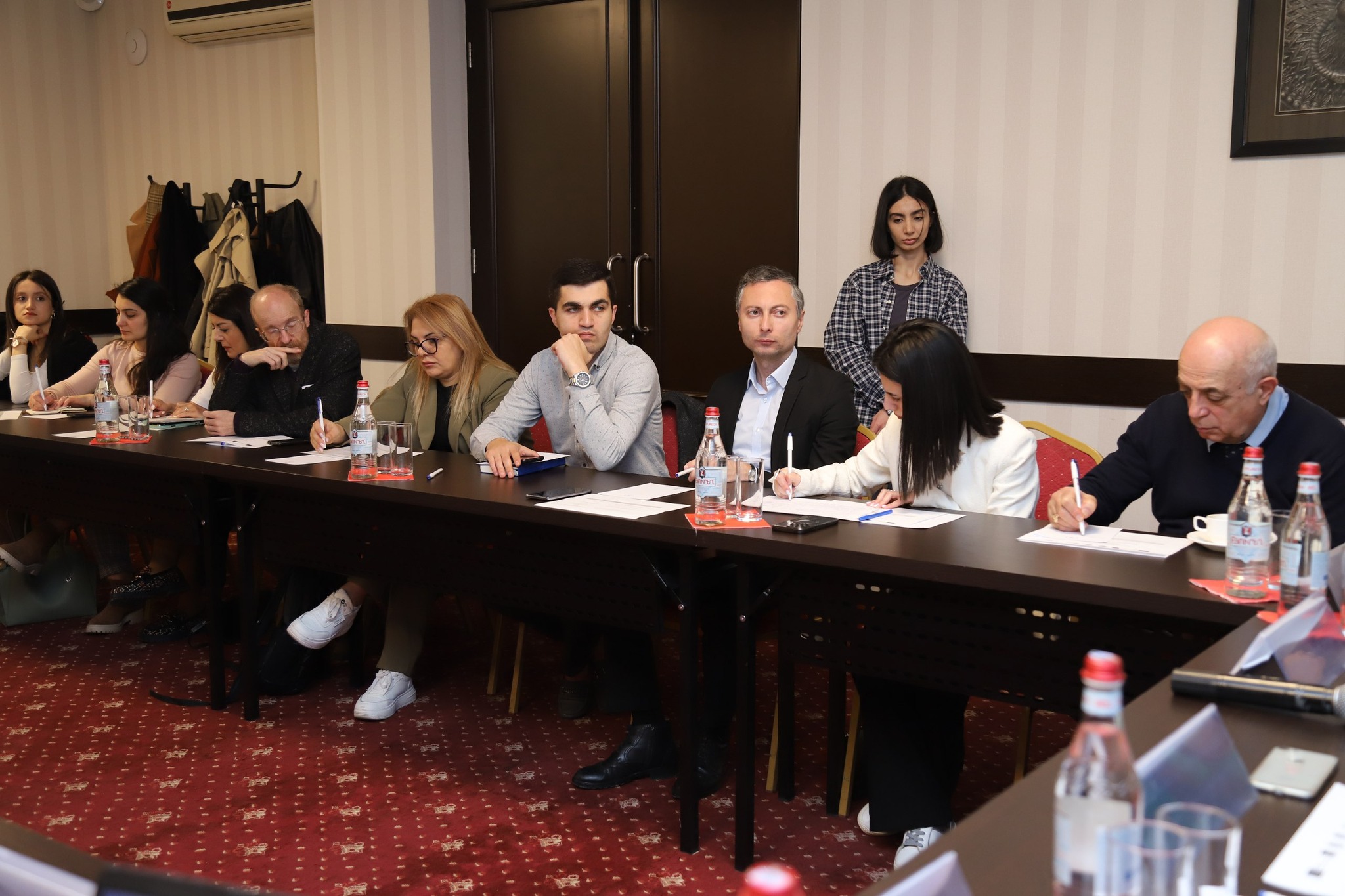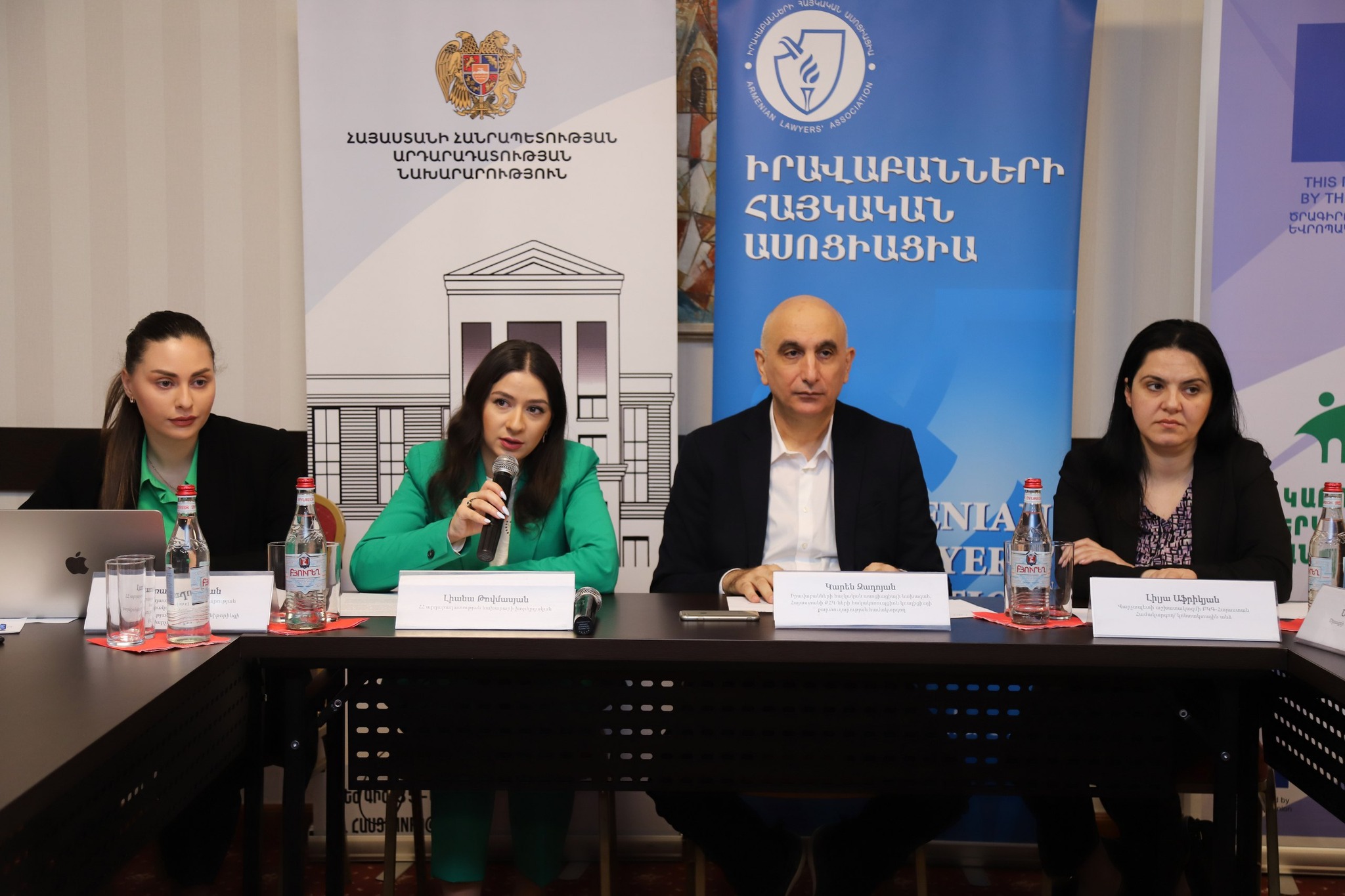The Armenian Lawyers’ Association (ALA) in cooperation with the Ministry of Justice organized an expert discussion within the “Multifaceted Whistle-Blowing Promotion in Armenia” project aimed at improving the whistleblowing system.
The existing structures regarding the whistle-blowing institute, the legal and practical problems arising within them, as well as the possible legal and practical problems that imply the risk of occurrence, were discussed with the participation of state bodies, international and Civil Society Organizations and the expert community.
In his opening speech, the ALA President stated that it is necessary to make the list of corruption crimes, which should be reviewed, a subject of discussion.
“We are constantly monitoring, government agencies have not been able to explain what standards they were guided by when compiling the list. We will face serious problems when we start dealing with the issue of returning assets that are located abroad. It can be said that the connection between the mentioned list and the structures of confiscation of property of illicit origin is weak or totally absent,” Mr. Karen Zadoyan said, and added that the development of the whistle-blowing system is also related to the mentioned list.
Adviser to the Minister of Justice Ms Liana Tovmasyan said that one of the special elements and foundations of the fight against corruption is the manifestation of intolerance towards any manifestation of corruption. “The whistleblowing institute is of particular importance, especially in countries like the Republic of Armenia. Why? Because usually reporting corruption cases to public authorities causes certain worries among citizens,” she said.
According to Ms Tovmasyan, the whistleblowing system, like any new institution, is developing organically and has already reached the point where legislative changes will be necessary. “This is confirmed by all specialists in the field, according to this, with our new strategy, we fixed and assigned actions that will be aimed at the complete review and improvement of the whistleblowing system, especially the mechanisms for the protection of whistleblowers, which is the most important point in this institute, and the mechanisms of encouragement” Liana Tovmasyan said.
Ms Lilia Afrikyan, OGP Coordinator/Point of Contact of the Office of the Prime Minister of the Republic of Armenia, noted that there are various discussions and meetings regarding the establishment of the whictleblowing system.
“Considering that the system is completely new and multilateral meetings with all partners and supporters are needed for its implementation. In general, the concept of “open government” implies close cooperation within the implementation of various reforms.
Establishing a whistleblowing system will be one of the mechanisms that will enable citizens to participate in the fight against corruption. In Armenia, in general, I always have said that when we talk about the implementation of various systems, from the legal point of view, from the point of view of tools, everything seems to be sufficient for us, we comply with the proposals given by international organizations, we do it consistently, but we ourselves are not sufficient in law enforcement practice, “ she said
Ms Lara Petrosyan, Head of the Department of Anti-Corruption Policy Development and Monitoring of the Ministry of Justice, presented the measures related to the Whistleblowing Institute within the framework of the Anti-Corruption Strategy and the legislative reforms to be implemented in the near future.
“It is planned to review the institute of responsible persons for whistleblowing, their selection, ans appointment, because those responsible for whistleblowing are the people who face the issues that people should address if they encounter cases of corruption,” she said.
4 actions of the anti-corruption strategy are dedicated to the improvement of the whistleblowing system itself.
ALA Expert Ms Syuzanna Soghomonyan spoke about internal and external whistleblowing, which, in her estimation, are at a low level.
“During 6 years, we had 13 cases of whistleblowing and 73 cases of external whistleblowing. The low rates were due to poor outreach efforts as well as institutional problems. Since December, when the awareness work started, the Minister mentioned in his speech that both the quantitative and qualitative indicators of whistleblowing have increased by 80 percent,” the expert noted.
ALA expert Ms Mariam Zadoyan presented the proposals of the structure aimed at improving and encouraging whistleblower protection mechanisms, as well as guarantees for safety and anonymity.
According to Ms Zadoyan, the regulations for the protection of whistleblowers’ safety, as well as the possibility of restoring whistleblowers’ violated labor rights and providing financial compensation are problematic.
“Not only have the USA, but also EU countries introduced financial mechanisms to encourage whistleblowers. There is a proportion between the money returned to the state and the incentive given to the whistleblower from that money, which is around 10-30 percent. There were countries that invested 1-2 percent and it did not stimulate the whistleblowing,” she said.
Mr. Hakob Aslanyan, Deputy of the “Civil Contract” faction of the National Assembly, also participated in the discussion. He noted that the fight against corruption should start with a change in mentality.
“The manifestations of corruption can decrease if a person develops patriotism from a young age. The international experience should be studied, only the idea should be taken from other countries, the rest should be done from inside, in order to correspond to our thinking, our situation. We still have not been able to get out of tribal thinking,” Aslanyan said.
Summarizing, the participants highlighted the importance of the discussions within the framework of the improvement of the institute.
The representatives of the Ministry of Justice stated that they are ready to discuss all concerns and proposals and take them into account in the framework of further legal processes.













































